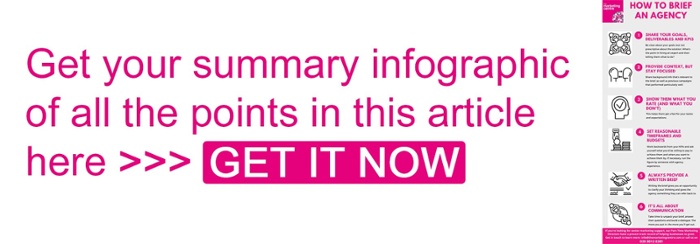This is the second in a series of posts exploring how to work with agencies. In the first post, we looked at how to identify the kind of support you need, shortlist potential partners and invite them to pitch. In this article, we’ll look at how to prepare an agency brief and agree a budget.
Creating the brief
A clear and considered brief will help bring your agency up to speed and increase the likelihood of them delivering the desired results. Crucially, it also helps clarify your own thinking. The process of writing a brief forces you to document what you want to achieve, what your priorities are and reflect on any learnings from the past.
- Download our free guide: Business to Business Lead Generation - Generating, nurturing and making the most out of your leads
There are different types of briefs for different tasks. The brief for a rebrand will be different from a brief for a PR campaign. But there are common qualities that distinguish a great brief from a disappointing one. Here are four key considerations when writing any agency brief.
Share your goals, deliverables and KPIs
Describing what you’re trying to achieve and how you’ll measure success is the core part of any brief. If you included nothing else, a set of goals, deliverables and KPIs would give most agencies enough information to propose an approach.
"Make sure you explain that these KPIs are what you’ll use to validate whether or not your investment has paid off."
When setting goals and KPIs, be as specific as possible. “Deliver a 25% increase in web visits and a 10% increase in web conversions from potential customers in our target segment" is more useful than “increase the traffic to our website”. This will also help your agency to understand your expectations, which is another key aspect of your brief. Make sure you explain that these KPIs are what you’ll use to validate whether or not your investment has paid off.
Be clear about your goals, but avoid being prescriptive about how to achieve them. There’s little point in hiring an expert and then telling them exactly what to do. Allowing them to come up with their own solution will give you the full benefit of their expertise.
Provide context - but keep it focused
The best briefs are focused. Overloading your agency with unnecessary background information or context can distract them. However, it’s also important for them to understand how you got here, what other activities you have going on, what’s worked in the past and what hasn’t.
It is important to pass on other documents such as brand guidelines, tone of voice guidelines, your value proposition or content strategy. But make sure that you’re sharing documents that are relevant to the task.
Show them what you like (and what you don’t)
If your brief requires creative or strategic branding work, you may want to provide some examples of other campaigns that you think are good or that you didn’t like. This will help them get a feel for your tastes and also understand your expectations.
You may also wish to share examples from your competitors, but don’t emulate them or be afraid to look outside of your competitor set for inspiration. You want to outperform the competition, not imitate them.
.jpg?width=650&name=Show%20them%20what%20you%20like%20(and%20what%20you%20don%E2%80%99t).jpg)
Remember also that you are looking for something that delivers your business goals. This may, or may not be something that everyone "likes". For this reason, it’s important that your brief defines who the decision makers will be. This gives the agency a clear pathway to who to contact in the event that ‘executive’ decisions need to be made. Importantly, identifying the decision makers also forces you - the client - to be clear on the matter before you get an agency on board.
Set reasonable timelines and budgets
The less time and budget you allow for, the less time the agency will be able to spend trying to help you. There’s little point in deciding to work with an agency, telling them what you want to achieve, then setting a budget or a timeline that undermines your goals.
Setting budgets can be tricky. One of the best ways to do it is to work backwards from your KPIs and ask yourself what you’d be happy to pay to get those results. This figure can be your ballpark. If you’re unsure what the ballpark should be, ask a peer who has experience working with agencies what they’d expect to pay.
- You may like: Fitting your budget to your marketing plan
Don’t ask the agency to tell you how much they think you should pay. They may suggest a figure that they think you’ll sign off, rather than the amount of time they really need to deliver the results you’re asking for. Day rates can also vary between agencies, making any meaningful comparison difficult. Setting an expected budget gives them a starting point to work from.
Provide a clear deadline for the work to begin (if it’s an ongoing retainer) or be delivered (if it’s a specific project). Agency teams will work across multiple clients at any given time and have internal approval processes that exist to guarantee the quality of the work. The less time you give them, the more likely they are to cut corners and rush things.
If you have multi-layered or complex approvals processes - including legal sign off, for instance - it’s worth explaining this in the brief. You will also need to agree project management tools.
"They will understand each other much better without the filtering."
Finally, if you’re working with multiple agencies, introduce your partners and open up the channels of communication between them. This will minimise the chances of you becoming a ‘middle-man’, ferrying messages between them, and they will understand each other much better without the filtering.
The importance of good communication
Maintaining a good agency relationship is about communication and that dialogue starts with the agency brief. Taking the time to explain what it is you’re hoping to achieve, and how you’ll measure performance, along with the budget you’re willing to spend, and your timelines will give the agency what they need to help you reach your goals. It might be tempting to think that you could give a brief over the phone or in person, but a written brief has the benefit of making you reflect on and consider everything you write down. It also gives all parties something they can refer back to at anytime.
For more information on how to set budgets and measure ROI, download Making Marketing ROI Work For You.
Images via AdobeStock and Pixabay




-1.png?width=800&height=500&name=Expert%20View%20(1)-1.png)
